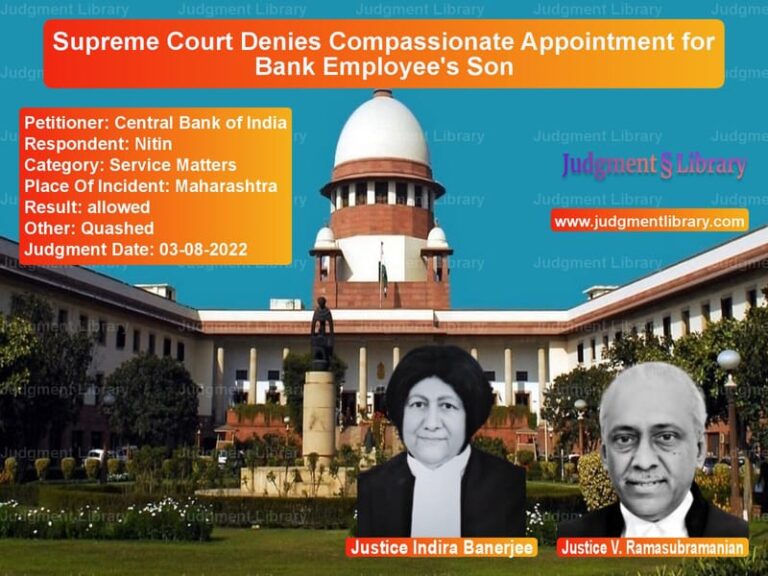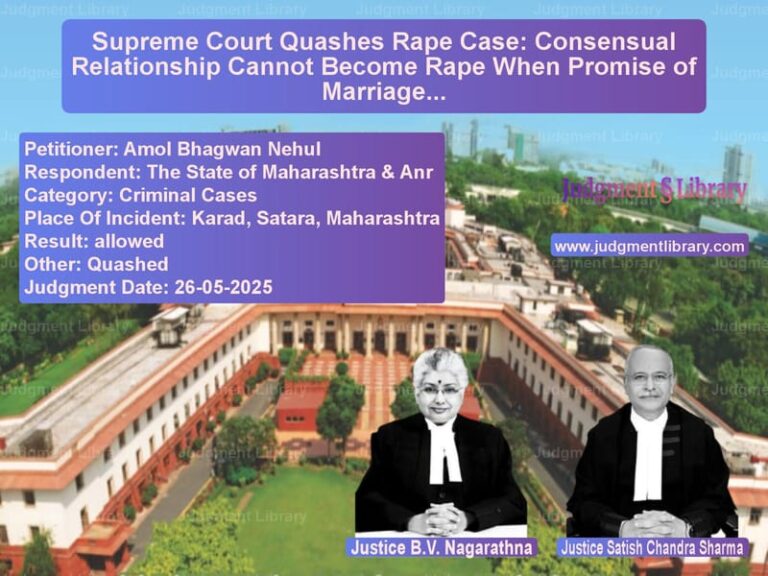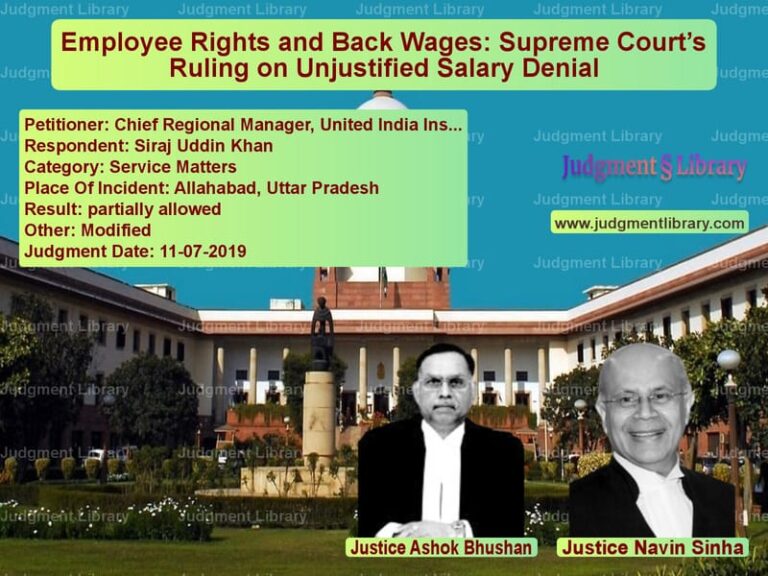Supreme Court Sets Aside High Court Order in Property Dispute Due to Procedural Lapses
The case of The Koushik Mutually Aided Cooperative Housing Society v. Ameena Begum & Another deals with a significant procedural issue regarding the setting aside of an ex-parte decree in a property dispute. The Supreme Court examined whether the High Court had correctly entertained a Civil Revision Petition (CRP) against an order dismissing an application for condonation of delay, rather than directing the respondent to file an appeal as per the correct legal procedure.
Background of the Case
The dispute arose from a property sale agreement dated April 26, 1985, between the appellant housing society and the respondents. The appellant filed a suit (O.S. No. 1144/1988) before the V-Senior Civil Judge, City Civil Court, Hyderabad, seeking specific performance of the agreement. The respondents were set ex-parte, and the Court passed an ex-parte decree on February 15, 1999.
Nearly 16 years later, on January 7, 2016, the first respondent filed an application seeking to set aside the ex-parte decree under Order IX Rule 13 of the Code of Civil Procedure (CPC). Along with this, an application for condonation of a delay of 5767 days was filed under Section 5 of the Limitation Act, 1963. The Trial Court dismissed both applications on June 7, 2018.
Aggrieved, the first respondent approached the Telangana High Court by filing a Civil Revision Petition (CRP) No. 4866/2018. On January 8, 2021, the High Court condoned the delay and directed the Trial Court to hear the case. This prompted the appellant to move the Supreme Court.
Legal Issues Raised
- Was a Civil Revision Petition under Section 115 of the CPC maintainable against an order dismissing an application for condonation of delay?
- Did the High Court err in bypassing the statutory remedy of appeal under Order XLIII Rule 1(d) CPC?
- Was there sufficient cause to condone a delay of 5767 days in filing an application to set aside the ex-parte decree?
Arguments of the Appellant
The appellant’s counsel argued:
- The High Court should not have entertained the Civil Revision Petition when an appeal was the correct remedy under Order XLIII Rule 1(d) CPC.
- The Trial Court rightly dismissed the application for condonation of delay, as the respondent failed to provide sufficient justification for the 5767-day delay.
- The High Court’s order went beyond its jurisdiction by effectively setting aside the ex-parte decree without proper appeal proceedings.
- The ex-parte decree had remained unchallenged for 16 years, and setting it aside now would create serious prejudice against the appellant.
Arguments of the Respondents
The respondents, represented by senior counsel, contended:
- The High Court exercised its jurisdiction correctly under Section 115 CPC to rectify a grave procedural injustice.
- The delay in filing the application was due to the respondent’s lack of awareness about the ex-parte decree and should be condoned in the interest of justice.
- The High Court’s decision to allow the application and direct the Trial Court to hear the case afresh was justified.
Supreme Court’s Observations
1. Appeal, Not Revision, Was the Correct Remedy
The Supreme Court held that the High Court erred in entertaining a Civil Revision Petition when an appeal under Order XLIII Rule 1(d) CPC was the correct legal remedy. The Court clarified:
“A Civil Revision Petition under Section 115 CPC is not maintainable when an alternative and effective appellate remedy is available.”
2. Delay of 5767 Days Was Unjustified
The Court examined the reasons provided by the respondent for the delay and found them unconvincing. The judgment noted:
“The explanation offered does not establish sufficient cause for condoning an extraordinary delay of 5767 days.”
3. Ex-Parte Decrees Cannot Be Set Aside Lightly
The Court emphasized that an ex-parte decree cannot be set aside merely on the basis of a belated challenge without substantial cause.
4. The High Court Overstepped Its Jurisdiction
The Supreme Court criticized the High Court’s approach in setting aside the ex-parte decree without proper appellate scrutiny.
Final Judgment
The Supreme Court ruled:
- The High Court’s order condoning the delay and directing the Trial Court to hear the case afresh was set aside.
- The respondent was granted liberty to file an appeal under Order XLIII Rule 1(d) CPC before the High Court by December 31, 2023.
- The High Court was directed to hear the appeal without raising objections related to limitation.
The Court concluded:
“In the circumstances, we set aside the impugned order on the ground that the said order was passed in a Civil Revision Petition which was not maintainable under Section 115 CPC.”
Key Takeaways
1. Proper Appellate Remedies Must Be Followed
A Civil Revision Petition cannot be used as a substitute for an appeal when an appeal is the prescribed remedy.
2. Delay in Challenging Ex-Parte Decrees Must Be Justified
Courts will not entertain excessive delays unless a compelling explanation is provided.
3. High Courts Must Exercise Caution in Procedural Matters
High Courts must ensure they act within their jurisdiction and do not set aside lower court orders without proper legal procedure.
4. Supreme Court Reaffirms Strict Interpretation of Limitation Laws
The ruling underscores that procedural lapses cannot be overlooked if they affect the rights of the other party.
Conclusion
The Supreme Court’s ruling reinforces the principle that procedural laws must be strictly followed to ensure fair adjudication. It clarifies that ex-parte decrees cannot be overturned without substantial justification and that proper appellate procedures must be adhered to. This decision will guide future cases involving procedural errors in setting aside judgments.
Petitioner Name: The Koushik Mutually Aided Cooperative Housing Society.Respondent Name: Ameena Begum & Another.Judgment By: Justice B.V. Nagarathna, Justice Ujjal Bhuyan.Place Of Incident: Hyderabad, Telangana.Judgment Date: 30-11-2023.
Don’t miss out on the full details! Download the complete judgment in PDF format below and gain valuable insights instantly!
Download Judgment: the-koushik-mutually-vs-ameena-begum-&-anoth-supreme-court-of-india-judgment-dated-30-11-2023.pdf
Directly Download Judgment: Directly download this Judgment
See all petitions in Contract Disputes
See all petitions in Property Disputes
See all petitions in Judgment by B.V. Nagarathna
See all petitions in Judgment by Ujjal Bhuyan
See all petitions in allowed
See all petitions in Quashed
See all petitions in supreme court of India judgments November 2023
See all petitions in 2023 judgments
See all posts in Civil Cases Category
See all allowed petitions in Civil Cases Category
See all Dismissed petitions in Civil Cases Category
See all partially allowed petitions in Civil Cases Category







